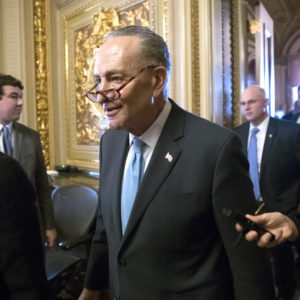In case you haven’t noticed, congressional Democrats are giddy about their 2018 prospects.
“History is on our side,” argues House Minority Leader Nancy Pelosi. Her colleague Rep. Ted Lieu of California predicts “a bigly blue wave” splashing in November.
Their optimism is not entirely unfounded. Historically, a newly elected president’s party has often lost midterm seats during his first term in office. In 2010, President Obama’s Democratic Party lost more than 50 House seats, as conservative candidates pounced on the unpopular Obamacare vote and the scary reincarnation of Big Government liberalism.
Giddy Democrats also point to President Trump’s approval ratings and generic ballot numbers as proof of the “anti-Trump wave” to come.
But if a Republican bloodbath is looming, as Democrats claim, then why push a politically risky shutdown of the government over illegal immigrants? Why risk such an unpopular political move if the electoral map is supposedly tilted in your favor?
Last Friday, House Republicans passed a short-term spending bill to avert a shutdown, not only funding the federal government for a month, but also providing six years’ worth of funding to the Children’s Health Insurance Program that covers nine million children across the country.
But the House bill died in the Senate within hours, as Sen. Chuck Schumer and other Democrats failed to cooperate. Why? Because the spending bill designed to keep the government open, fund the military, and support impoverished children nationwide didn’t address the Deferred Action for Childhood Arrivals program. That’s right: Senate Democrats shut down the government to protect DACA recipients.
Although the shutdown has since ended, it won’t be swept under the rug. The shutdown could have potentially left more than two million military service members unpaid, while sending 100,000 national guardsmen home. Moreover, nine million children were at risk of temporarily losing their health insurance, resulting in potentially life-threatening removal of treatment.
As you might imagine, the Schumer shutdown was anything but politically popular. According to a recent Harvard CAPS/Harris Poll, the overwhelming majority of Americans (58 percent) oppose a government shutdown caused by DACA. Nearly two-thirds of independents oppose a shutdown to shield illegal immigrants.
It’s worth noting the poll was administered by former Clinton pollster Mark Penn, who claims “a shutdown over DACA could well backfire as the public is hugely sympathetic to the ‘Dreamers’ but don’t think closing the government is the way to handle it.”
Even the liberal media is blaming Democrats for putting pro-amnesty politics over country. One recent New York Times headline reads: “Democrats Seem Set to Block Bill to Keep Government Open.” Another New York Times story led with “Senate Democrats, showing remarkable solidarity in the face of a clear political danger, blocked consideration of a stopgap spending measure to keep the government operating.”
“Clear political danger” is an understatement. As November nears, Democrats are left with several unanswered questions. Why even risk being blamed for a government shutdown if a blue wave is coming, as political pundits and media elites suggest? And why focus on the one issue (illegal immigration) that propelled President Trump to the White House? How do you appeal to independent voters by prioritizing illegal immigrants over our troops, veterans, and children’s healthcare?
Whether they like it or not, all 2018 Democratic candidates will now face the consequences of the Schumer shutdown that prioritized illegal immigrants over American citizens. When even Clinton pollsters and liberal newspapers question the strategy, it’s probably not a winning platform for Democrats running in Trump country.
There are only two takeaways: Democratic leaders are either clueless political strategists or their so-called 2018 electoral advantage isn’t as decisive as we’re being told—and they’re willing to take a risky bet because of it. Or maybe it’s a little bit of both.

